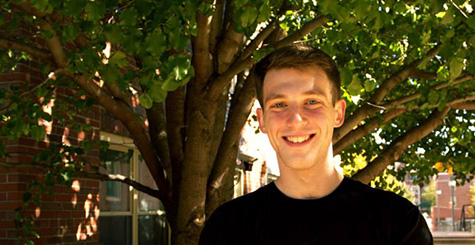
Alex Tinianow has been selected to receive the 2014 Harrison D. Stalker Award from the Department of Biology in Arts & Sciences at Washington University in St. Louis.
This award is named in honor of the late Harrison D. Stalker, PhD, who was a member of the biology faculty from 1942 to 1982. In addition to being a renowned evolutionary biologist and an inspiring teacher, Stalker was a great advocate of the arts and a world-class photographer.
The award is given annually to a graduating biology major whose undergraduate career combines outstanding scientific scholarship with significant contributions in the arts and humanities.
Tinianow, a biology major with a neuroscience track and a jazz studies minor, is a summa cum laude candidate who exemplifies the combination of scientific contribution and artistic expression this award seeks to recognize.
Tinianow translated his interest in how the brain works into a two-year undergraduate research project with Erik Musiek, MD, PhD, in the David Holtzman laboratory in the Department of Neurology at the School of Medicine. There, he examined how chronic jetlag influences the progression of Alzheimer’s disease in mouse models. Jetlagged mice, whose light-dark schedule was advanced by six hours once a week for eight weeks, had more amyloid-beta plaque burden than non-jetlagged control mice.
In addition to working in the lab, Tinianow currently serves as a tutor for the introductory biology course, Principles of Biology I.
Tinianow combines scientific curiosity with achievements in the arts. A talented musician, he has played piano and alto saxophone in the jazz combo and jazz band programs in the Department of Music. He also helped to create a new vocal jazz ensemble that is now a permanent part of the jazz combo program, and he and the group have performed in the Jazz at Holmes Concert Series.
Aside from jazz, Tinianow also enjoys playing percussion, songwriting, acting and mentoring young musicians as a senior counselor at Camp Encore/Coda, a summer music camp.
In addition, Tinianow is the artistic director and former assistant musical director and treasurer of The Ghost Lights, a student-run WUSTL a cappella group.
His interests in neuroscience and music also converged when he assisted in a clinical study at the School of Medicine, led by Gammon Earhart, PhD, that examined the use of tango to treat Parkinson’s disease patients, who often move better to music than they can in silence.
After graduation, Tinianow plans to work as a research assistant in preparation for applying to either a PhD or MD/PhD program in neuroscience.